#literary genres
Text
what genre is homestuck Actually
is it science fiction? is it fantasy? is it film noir? is it a thriller? is it paranormal erotica? is it lovecraftian horror? is it coming-of-age? is it nonfiction? Who Knows
#homestuck#literary genres#my patron troll is karkat#judge how you wish#i first read homestuck to impress a boy#the sad part is#it worked?
308 notes
·
View notes
Text
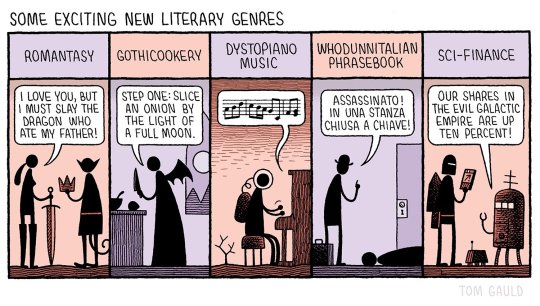
120 notes
·
View notes
Note
Hey hey! 7, 23, 65 for the writer asks? c:
Hey there! :D
Here you go, thanks for asking!
I'm gonna put a cut because... Because the first two questions tackles in the perilous field of "Arja majored in literature and every time she has to discuss storytelling meta she's like this":
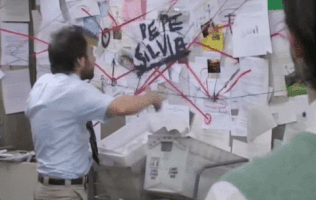
Tis the prompt list.
7. How do you choose which POV to write from?
I think of who could give the most interesting insight over the same event, and choose according to that. It all depends on what I'm trying to achieve with that piece of writing and the vibe I want to give: in the end a dramatic event stays dramatic, the pov just changes the flavour.
Example: In the Wicked Eyes and Wicked Hearts chapter, I switch the POV a couple of times accordingly. In the first scene, it's Aisling because she's the only one to exactly hear what dear Gaspard has to tell her. It must be her POV to avoid a long explanation of how she felt in that moment... That she wouldn't want to give, because the second POV is Cullen and knowing he's not faring well, she would never, at this point, go into many details about how bad she felt. You can see in the second scene what would have happened if the POV started with Cullen right away. Yes, you get what happened... I think, tho, that seeing it first-hand could give a nice other side.
It changes again for the mission because I wanted a little "Why the heck is she explaining us her plan?" moment, and to start introducing that there are other people working behind the ballroom.
And the last scene, with the final duel with the assassin (censoring who is it because a friend who reads me hasn't played Inquisition and if she hasn't read that chapter I don't want to spoil her GREIS DON'T CLICK) which I kept even if SOMEHOW Aisling in game won Belle of the Balle (don't ask me why, Josie drugged her)... I switched back to Cullen, because him not knowing exactly what the Science Bros had planned added a sense of uncertainty and urgency that made the pace quicker and more surprising... Which fitted, I wanted a super quick scene.
Hope it made sense xD
23. Best writing advice for other writers?
EDITED because the former one was more for Original writing and meh I thought of something better.
Originality is overrated.
And by which I mean: looking and actively pursuing something truely original at all costs will only stress you out. It goes in original and fanfiction writing. Stories got told all the time, and if you didn't start writing out of a bubble without ever consuming any work of fiction, you'll get influenced by stuff you liked, whether you want it or not. It's normal, it's something you can see in big ass authors, in authors that you study as "big innovators".
Futurists, who prided themselves in being truely, 100% original by doing something entirely new... Still were influenced by what came before. Because to do the opposite of what came before you must know what did. You must know what you don't want to do if you want to do something different.
And that's why Italian futurists were assholes and I hate them and you shouldn't praise them fuck you Marinetti. Russian futurism is something entirely, wildly different and the Russians HATED the Italians with a reason But I shan't start talking about futurists or we'll end up with an essay on that let me just kiss gently on the forehead mr Livshits I love you Benedikt Konstantinovich and your glorious autobiography.
All it matters is not what you write. Is HOW you write it. Give it your vision, give what matters to you, and even if the basic story is yet another fic of a pairing that got written by so many people... Nobody wrote your specific vision of it. And that's all that matters.
At the end of the day, in the hands of a good writer who believes and has something personal to say about a certain trope... The tropes I like the least on paper are something I enjoy from people that thought about it and that you can SEE loved that story. And it's great.
Edited from before because thinking about it better, it's true that genre should not be considered so fixed as I sometimes see them being... But I thought about it better and "mediocrity" shouldn't be so shunned. Write your story, I don't care if it's good. If it makes you happy writing it, if it makes you crack a smile and it doesn't offend people, go for it. Mediocrity is good, mediocrity shouldn't be demonized or looked upon with a frown. If it brings ONE smile to one person, that's a good book, no matter the originality of it. Which brings us to the point I edited this in.
65. Tell us about what you’re most looking forward to writing – in your current project, or a future project
Uh, currently? I can't wait to end Monster Fic to start with DadWolf x°D
Beside that, I got half an idea of expanding a little on the collection of prompts about Raina... And writing something about the duel with the Arishok. Peak drama, peak tragic hero moment. I need to structure it a little better in my head, maybe replay that mission to have a clearer mind (the last time I played it it was with Garrett, aka a mage... Raina is a rogue and after Leandra she'll kill herself before allowing him to go in her place. Really it would be a categoric "No you're not going. Not in a million years." Yes they'll have the fight of a lifetime afterwards.). But yeah.
Also since today I really want to write a snippet of Dark Lady AU in which Cullen makes it to Barad Dur in friendlier terms and notices that there are cats EVERYWHERE. And as every good dog person that doesn't really like cats all that much he'll be LOVED by all the cats. He'll go to sleep and wake up from the purring. Will get used to it pretty soon, he just never paid that much attention to cats.
Nazgul flying from Barad Dur to Mordor with backpacks with portholes to bring their cats around.
#petrel replies#fic writer asks#literary genres#I know the publishing houses will ask you to put your novel into a genre#but don't take the genres rules too seriously#don't put elves in your fantasy just because you have to if you hate elves
10 notes
·
View notes
Text
Apparently, one of my biggest pet peeves is people confusing the literary genre of fantastique (or fantastic) with fantasy.
IT'S NOT THE SAME.
Fantastique is when it's in the real world, and supernatural elements start appearing, and most of the times the narrator/character doubts that it's happening because that's not how their world is supposed to be. Examples: La Vénus d'Ille de Prosper Mérimée, The Phantom of the Opera, or vampire novels.
Fantasy's origins are in fairyland. As in, it starts already comprehending that the supernatural exists and is perfectly normal inside the narrative.
The Lord of the Rings: FANTASY, NOT FANTASTIQUE.
Twilight: FANTASTIQUE, NOT FANTASY.
This is actually making me so angry, wow. There's so much bullshit on Internet if you're searching the terms.
22 notes
·
View notes
Text
Delving into Poetic Wisdom: A Review of "On the Art of Poetry" by Aristotle
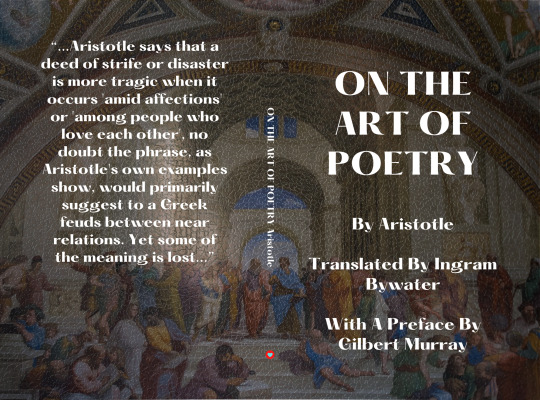
Aristotle's "On the Art of Poetry," translated by Ingram Bywater, stands as a seminal work in literary criticism, offering profound insights into the nature and function of poetry that continue to resonate with readers and scholars alike. Written in the 4th century BCE, this treatise serves as a comprehensive examination of the principles and techniques that underlie the creation of poetry, providing valuable guidance for poets and readers alike.
At its core, "On the Art of Poetry" is a testament to Aristotle's keen intellect and analytical prowess. In this work, Aristotle explores the various elements that contribute to the effectiveness of poetry, including plot, character, diction, and spectacle. Through his systematic analysis, Aristotle seeks to uncover the universal principles that govern the art of poetry, shedding light on its essential nature and its role in human society.
One of the most compelling aspects of "On the Art of Poetry" is Aristotle's emphasis on the importance of mimesis, or imitation, in poetry. According to Aristotle, poetry is a form of imitation that seeks to represent the actions, emotions, and experiences of human life. Through the skillful use of language and imagery, poets are able to create a vivid and lifelike portrayal of the world, inviting readers to engage with their work on a profound emotional and intellectual level.
Moreover, "On the Art of Poetry" offers valuable insights into the principles of dramatic structure and the role of catharsis in tragedy. Aristotle argues that tragedy is a form of poetry that evokes feelings of pity and fear in the audience, leading to a purgation or cleansing of these emotions. Through the depiction of the fall of a tragic hero, tragedy allows audiences to confront their own mortality and the fragility of human existence, ultimately leading to a deeper understanding of the human condition.
In addition to its exploration of tragedy, "On the Art of Poetry" also examines the principles of comedy and epic poetry, providing valuable guidance for poets working in these genres. Aristotle discusses the importance of unity of plot, character, and theme in epic poetry, as well as the role of humor and satire in comedy. Through his analysis, Aristotle highlights the diversity of poetic forms and the unique challenges and opportunities that each genre presents to the poet.
In conclusion, "On the Art of Poetry" by Aristotle is a timeless classic that continues to inspire and enlighten readers with its profound insights into the nature of poetry. Aristotle's systematic approach to literary criticism, coupled with his keen observations and analytical rigor, make this work an indispensable resource for anyone interested in the art of poetry. With its timeless wisdom and enduring relevance, "On the Art of Poetry" remains a cornerstone of literary theory and a testament to the enduring power of poetic expression.
Aristotle's "On the Art of Poetry," is available in Amazon in paperback 12.99$ and hardcover 18.99$ editions.
Number of pages: 116
Language: English
Rating: 10/10
Link of the book!
Review By: King's Cat
#Aristotle#Poetry#Literary criticism#Mimesis#Imitation#Dramatic structure#Tragedy#Catharsis#Comedy#Epic poetry#Unity of plot#Characterization#Diction#Spectacle#Poetics#Aesthetic principles#Greek literature#Philosophical discourse#Aristotle's theory#Literary analysis#Poetic form#Emotion#Human experience#Morality#Ethics#Aesthetics#Universal principles#Literary genres#Rhetoric#Imagination
2 notes
·
View notes
Text
Exploring Magical Realism in Literature: Blurring Reality and Fantasy
Within the vast landscape of literature, where words are both colors and brushes, the genre of magical realism emerges as a unique and enchanting tapestry. It’s a genre that possesses the alchemical power to blur the boundaries between reality and fantasy, allowing the extraordinary to dance with the ordinary. In this exploration, we dive into the enchanting realm of magical realism, uncovering…
View On WordPress
#Blurring Reality and Fantasy#Cultural Influence#Cultural Roots#Genre Exploration#Literary Genres#Literary Magic#Literature Genres#Luminous Ordinary#Magical Elements#Magical Realism#Narrative Blending#Narrative Techniques#Reader Engagement#Symbolic Magic#Symbolism in Fiction#Unique Storytelling#Writing Craft#Writing Tips
2 notes
·
View notes
Text
Delving into Poetic Wisdom: A Review of "On the Art of Poetry" by Aristotle
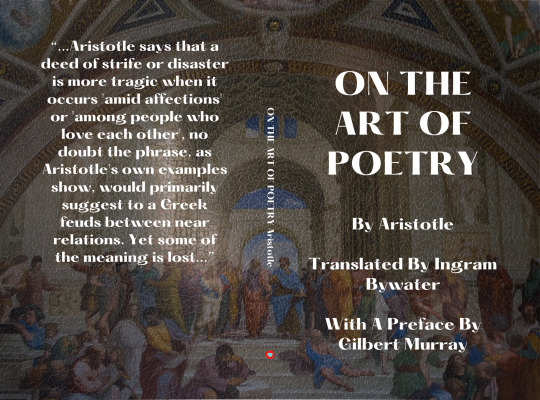
Aristotle's "On the Art of Poetry," translated by Ingram Bywater, stands as a seminal work in literary criticism, offering profound insights into the nature and function of poetry that continue to resonate with readers and scholars alike. Written in the 4th century BCE, this treatise serves as a comprehensive examination of the principles and techniques that underlie the creation of poetry, providing valuable guidance for poets and readers alike.
At its core, "On the Art of Poetry" is a testament to Aristotle's keen intellect and analytical prowess. In this work, Aristotle explores the various elements that contribute to the effectiveness of poetry, including plot, character, diction, and spectacle. Through his systematic analysis, Aristotle seeks to uncover the universal principles that govern the art of poetry, shedding light on its essential nature and its role in human society.
One of the most compelling aspects of "On the Art of Poetry" is Aristotle's emphasis on the importance of mimesis, or imitation, in poetry. According to Aristotle, poetry is a form of imitation that seeks to represent the actions, emotions, and experiences of human life. Through the skillful use of language and imagery, poets are able to create a vivid and lifelike portrayal of the world, inviting readers to engage with their work on a profound emotional and intellectual level.
Moreover, "On the Art of Poetry" offers valuable insights into the principles of dramatic structure and the role of catharsis in tragedy. Aristotle argues that tragedy is a form of poetry that evokes feelings of pity and fear in the audience, leading to a purgation or cleansing of these emotions. Through the depiction of the fall of a tragic hero, tragedy allows audiences to confront their own mortality and the fragility of human existence, ultimately leading to a deeper understanding of the human condition.
In addition to its exploration of tragedy, "On the Art of Poetry" also examines the principles of comedy and epic poetry, providing valuable guidance for poets working in these genres. Aristotle discusses the importance of unity of plot, character, and theme in epic poetry, as well as the role of humor and satire in comedy. Through his analysis, Aristotle highlights the diversity of poetic forms and the unique challenges and opportunities that each genre presents to the poet.
In conclusion, "On the Art of Poetry" by Aristotle is a timeless classic that continues to inspire and enlighten readers with its profound insights into the nature of poetry. Aristotle's systematic approach to literary criticism, coupled with his keen observations and analytical rigor, make this work an indispensable resource for anyone interested in the art of poetry. With its timeless wisdom and enduring relevance, "On the Art of Poetry" remains a cornerstone of literary theory and a testament to the enduring power of poetic expression.
Aristotle's "On the Art of Poetry," is available in Amazon in paperback 12.99$ and hardcover 18.99$ editions.
Number of pages: 116
Language: English
Rating: 10/10
Link of the book!
Review By: King's Cat
#Dramatic structure#Tragedy#Catharsis#Comedy#Epic poetry#Unity of plot#Characterization#Diction#Spectacle#Poetics#Aesthetic principles#Greek literature#Philosophical discourse#Aristotle's theory#Literary analysis#Poetic form#Emotion#Human experience#Morality#Ethics#Aesthetics#Universal principles#Literary genres#Rhetoric#Imagination
1 note
·
View note
Text
COMUNICACIÓN: Los géneros literarios (Spanish & English post).
El género literario de una obra no siempre puede precisarse. Las intenciones comunicativas del autor y la forma literaria (prosa o verso) que elija condicionan en gran medida su obra. Asimismo, la clasificación o agrupación de las obras literarias en géneros tiene actualmente una finalidad principalmente didáctica, en otras épocas su intención fue más normativa: se intentaba señalar previamente…

View On WordPress
0 notes
Text
Exploring Different Genres of Literature: Finding Your Writing Niche
Literature offers a vast array of genres, each with its own unique characteristics and readership. As a writer, finding your writing niche is crucial for developing your voice, understanding your audience, and creating stories that resonate. In this article, we will explore various genres of literature and provide guidance on how to discover your writing niche.
Understand Genre…

View On WordPress
#author advice#author&039;s journey#Creative Writing#discovering your style#exploring fiction#finding your niche#genre choices#genre diversity#genre exploration#genre selection#literary Exploration#literary genres#literary preferences#writing genres#writing identiy#writing passion#writing path#writing styles
0 notes
Text
Dancing with Words: A Symphony of Writing Forms
Dancing with Words: A Symphony of Writing Forms
In the realm of language, writing forms are the vibrant strokes that paint the canvas of expression, allowing writers to create worlds, weave tales, and evoke emotions. Each writing form is a unique dance, offering storytellers a diverse array of steps to choreograph their literary masterpieces. Let’s embark on a whimsical journey through the…

View On WordPress
#creative writing#English#english-learning#fairy tale#imagination#inglés#languages#learn-english#learning#literary expression#literary genres#literary journey#mystery#novels#poetry#short story#story telling#suspense#writerscraft#Writing Forms
0 notes
Text

Charles-Amable Lenoir (1860-1926)
"À la Recherche du Temps Perdu" ("In Search of Lost Time")
Oil on canvas
#paintings#art#artwork#genre painting#female portrait#charles amable lenoir#oil on canvas#fine art#french artist#portrait of a woman#red hair#book#books#literary painting#french literature#blue dress#dresses#clothing#clothes#1k#2k
2K notes
·
View notes
Text
youtube
EDITED TO ADD: St. Louis University posted the 2023 St. Louis Literary Award ceremony; Neil’s talk starts about 40 minutes in. (Thanks DanGuyF)
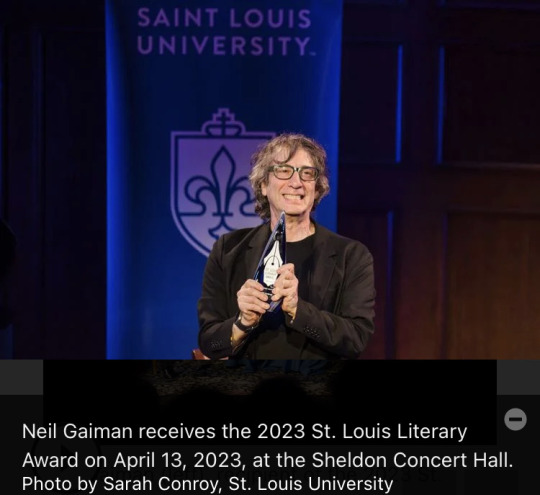
In an interview before the event [Neil] Gaiman said that when he started writing comics, he “wasn’t even in the gutter.”
He said: “I used to look up and admire the people in the gutter. The science-fiction people were in the gutter, the children’s literature people were in the gutter, too, and I was so far down, I was in the storm drain.”
Great writeup by Jane Henderson from the St. Louis Post-Dispatch sharing highlights of Neil’s talk at the St. Louis Literary Award!
#neil gaiman#comics#st louis#st louis literary award#it does look like a fountain pen#writing#genre#quotes#book talk#fantasy#with love from florida#Youtube
2K notes
·
View notes
Text
I found a game!
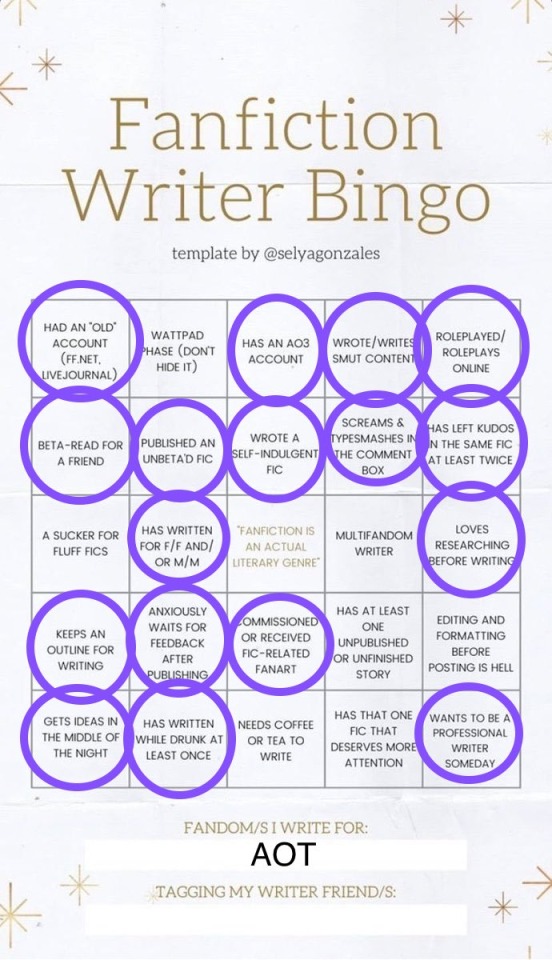
Bingo! Let it be known that all my fics are unbeta’d and extremely self-indulgent.
The template:
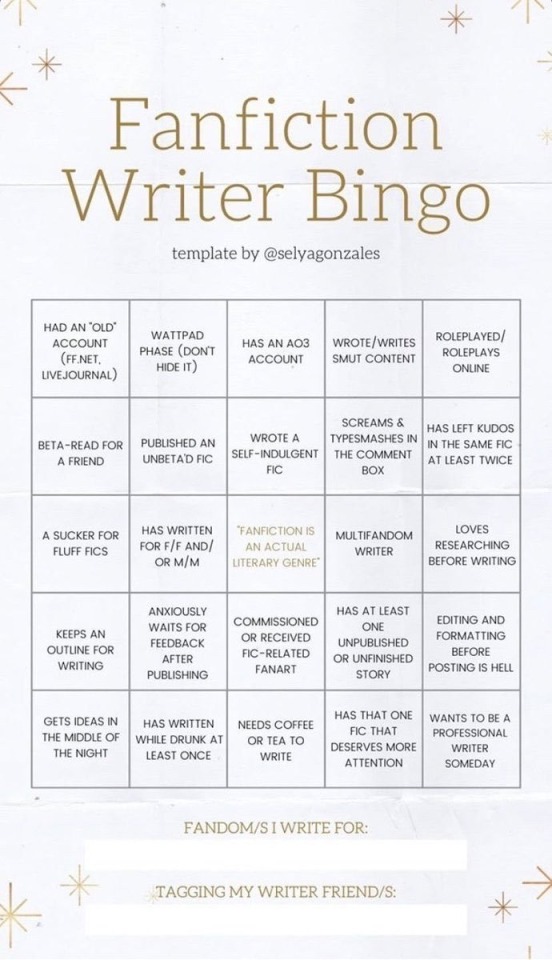
No pressure tag:
@marleysfinest @oxygenbefore1775 @pisspope @wyvernslovecake @honeybleed @moonspirit @lokiheart135 @hjemne and anyone else who would like to take part ✨
#personal#I do think that fanfic is a literary genre btw#I just read that the center field is considered automatically filled so I didn’t bother doing it again 😭
557 notes
·
View notes
Text
740 notes
·
View notes
Text
In Tokyo, sixteen-year-old Nao has decided there's only one escape from her aching loneliness and her classmates' bullying, but before she ends it all, Nao plans to document the life of her great-grandmother, a Buddhist nun who's lived more than a century. A diary is Nao's only solace—and will touch lives in a ways she can scarcely imagine.
Across the Pacific, we meet Ruth, a novelist living on a remote island who discovers a collection of artifacts washed ashore in a Hello Kitty lunchbox—possibly debris from the devastating 2011 tsunami. As the mystery of its contents unfolds, Ruth is pulled into the past, into Nao's drama and her unknown fate, and forward into her own future.
Full of Ozeki's signature humour and deeply engaged with the relationship between writer and reader, past and present, fact and fiction, quantum physics, history, and myth, A Tale for the Time Being is a brilliantly inventive, beguiling story of our shared humanity and the search for home.
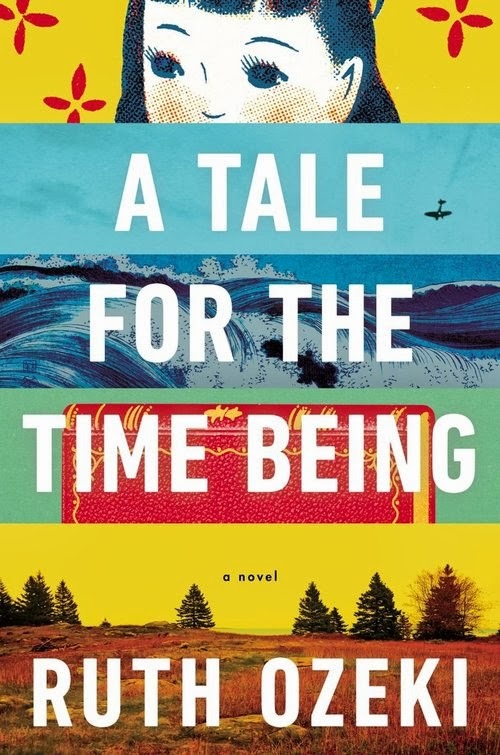
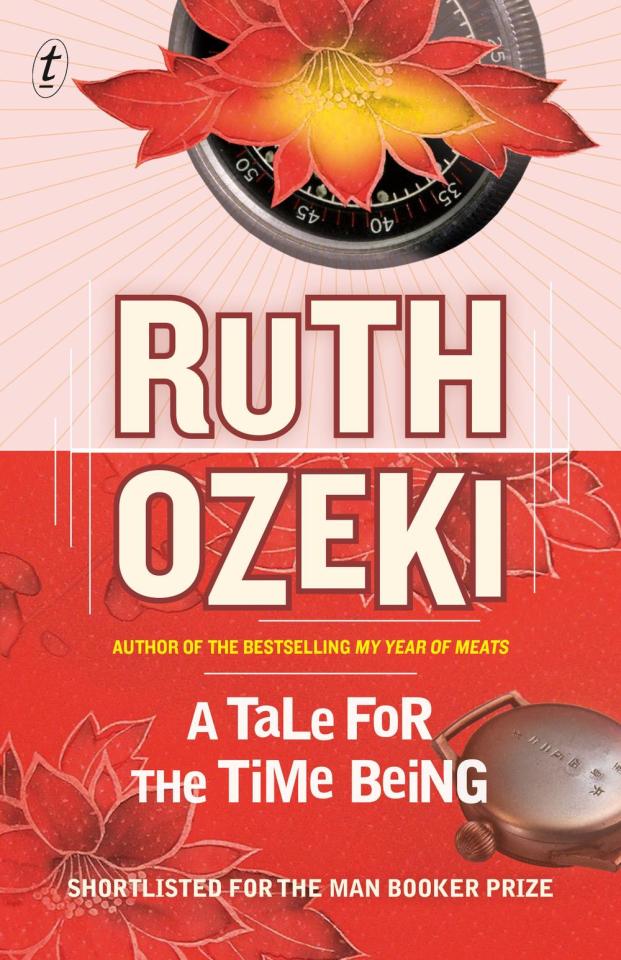
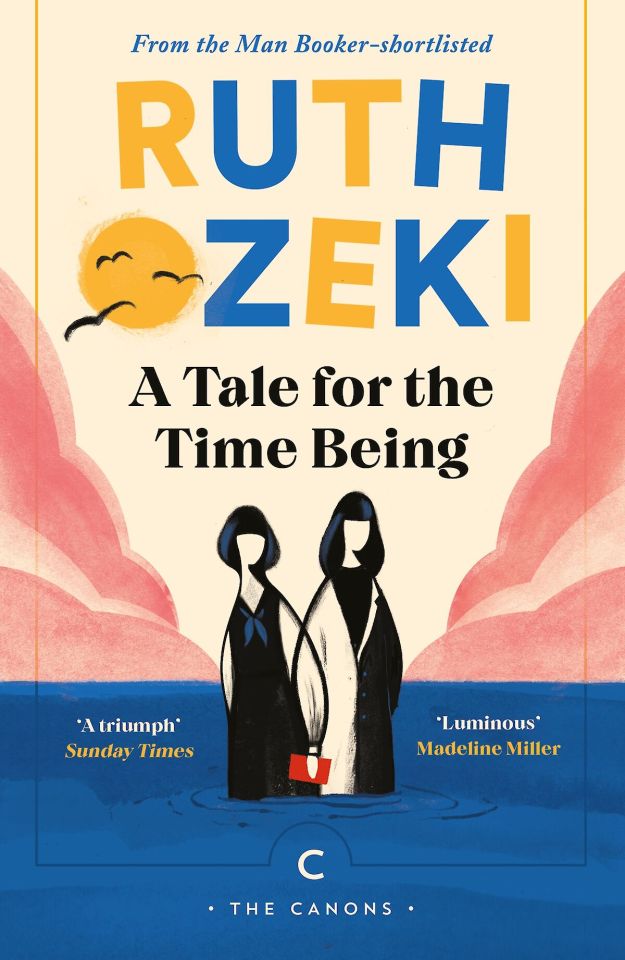
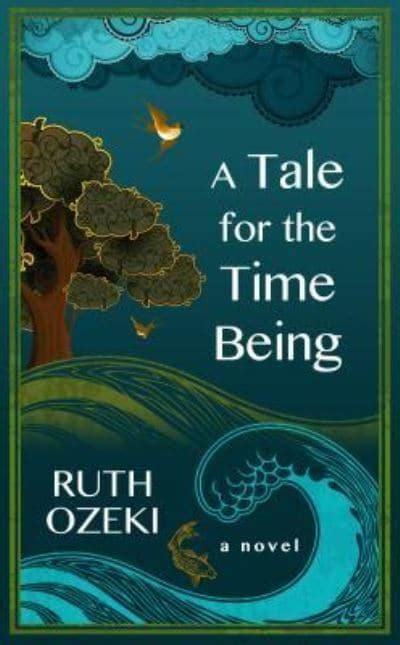
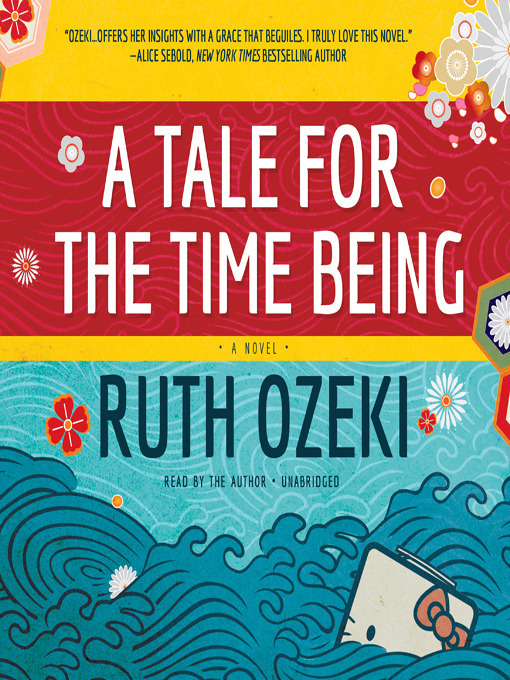
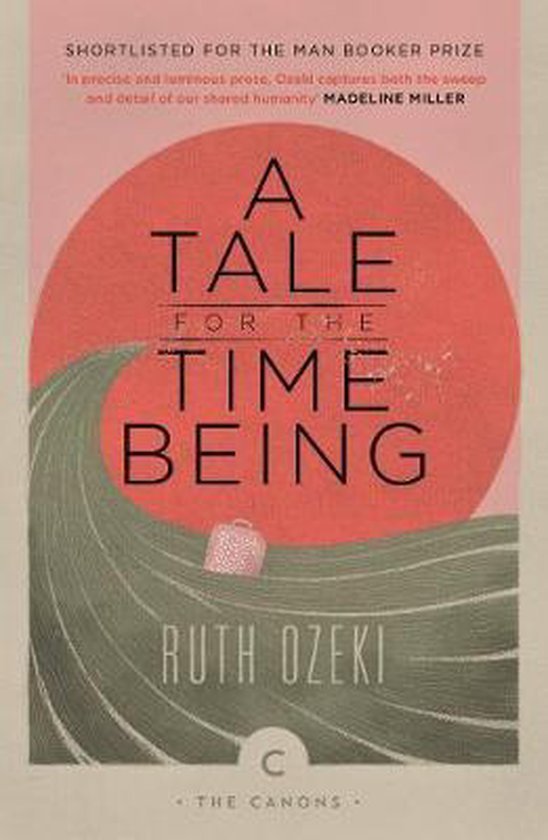
#book: a tale for the time being#author: ruth ozeki#gene: japanese literature#genre: magical realism#genre: historical fiction#genre: literary
242 notes
·
View notes
Note
omg I need your thoughts on the terminally o line author culture bc ngl it makes my eye TWITCH, there are authors I deliberately avoid even tho I've heard their stuff is good bc they're like that 🙈
HHHHH oh good lord, okay, from how I see it, there are two angles on this, both aggravating and sad: the official decree one and the spontaneous ecosystem one.
The officious one is that the nature of publishing nowadays demands an author have an online presence. You need Twitter/X. You need to let every potential reader know your book is coming out. You need engagement through reviews and pre-orders incentives (if you buy now you’ll get a special keychain!!) and word of mouth assurances from your peers that yes your book is as cool as you say it is. You need a newsletter with links (more buying! more voting on lists that are simply popularity contests!) and promises you’re still working on the next thing, don’t forget about me in the morass of everyone else doing the same thing. You need an Instagram and TikTok now to post pretty pictures and videos because one or two authors made it big off this kind of promotion and now everyone thinks it’s the ticket to the bestseller list (sadly, it seems to be working). You need an OnlyFans (a joke but I do recall a twt spat that was a joke/not joke about how rupi kaur will always be more beautiful than her critics and people who took issue with the conflation of beauty with talent). At the end of all this, you’re basically an influencer, a content creator creating content for the content you should be focusing on creating, the finished novel. And the novel itself seems to be disappearing behind the masks used to promote it (fanfic-style tropes, moodboards, playlists, memes) until I now no longer trust the book that I’ll pick up to have any resemblance to the enticements that brought me here. I’ve seen an author or two complain about the stress all this self-promotion generates, but it’s become such an entrenched part of the industry, I think people just accept it. And thus spend too much time online hoping that if they tweet just a little more, produce just one more reel, maybe that’ll be the difference between a sale and no sale.
The other side of this, distinct but obviously connected, is the ecosystem created by this panic of being perpetually visible coupled with the fact that so many of the new authors came of age during the rise of internet fandom culture. That opinionated community mindset that blurs the line between anonymity and friendship is the lens they bring to their own work. I mean, it makes sense I suppose—if you love yelling about characters and words, why wouldn’t you do that once you start to produce your own? This really came home to me hearing about that reviewbombgate “scandal” and how people involved were in reylo circles and that was used to provide receipts. You’re interacting with your readers and peers about your intimate work but they are also all strangers. They will not always give you the benefit of the doubt, and now—as opposed to the past when maybe the worst that could happen was a handful of bad reviews in newspapers—you will either be tagged in hate reviews, sub-tweeted, explicitly called out, demanded to atone for your sins. It’s no longer the morality of consumption but the morality of production. Of course, the easy answer is just log-off, touch some grass. But that can work only when you and everyone else are separated by anonymous accounts or when you have no platform to maintain. As an author trying to make your livelihood from this, suddenly it’s do or die. We’re in a strange moment of authorship bringing the Internet’s echo-chamber and claustrophobic into the real world (this is a lie: publishing now is no longer the real world. But it looks like it) and thus you can kind of no longer escape things.
Will the average reader who isn’t aware of all these machinations care about reviewbombgate? Would a reader browsing at Target think about the controversies around Lightlark? Very likely not. But the impression I’m getting more and more is that the average reader isn’t the one buying all the books. Or shall we say—a bestseller’s status relies on bookstore stock. Bookstore stock is only huge when they know a book will be a good investment. They’ll only know a book is a good investment if it and its author has street cred based on booktokkers, bookstagram, bloggers and reviewers (have you noticed how many books out these last maybe 1-3 years have these kinds of accounts thanked in the acknowledgments? Yeah), and THESE are also chronically online people who will Know. And decide the cast of fate.
Honestly, @batrachised, I see why you avoid these kinds of writers, though I wonder how long it’ll be before the disease becomes epidemic.
#i’m very doom and gloom about this if you couldn’t tell from my tone lmao#and of course it’s not a perfect formula; i read a decent debut this year by a writer trying to be very active on socials and idk how much#of a splash her book made because literary sff is a dying genre even with an ecological bent compared to the glut of romantasy#also this feels very timely because the goodreads choice awards were just announced and i am seething at seeing d*vine r*vals#get another accolade to its name#blake’s last braincell#blake talks shit#writing life
208 notes
·
View notes